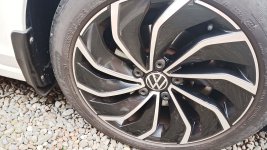Firstly, apologies for the long post, but diamond cut alloys are a pet hate of mine.
That’s white worm corrosion, which is pretty common on diamond cut alloys after a couple of years or so - sometimes sooner.
White worm can be caused by poor application of the lacquer when the alloys are manufactured. The shiny bare metal diamond cut surface doesn’t provide a good ‘key’ for the protective clear lacquer to bond to; additionally, the layer of lacquer may be quite thin on ‘sharp’ edges (e.g. where the polished face meets the black painted recessed areas between the spokes). Poor lacquer adhesion and thin lacquer coverage means that there’s a high risk of white worm corrosion, when water and moisture gets underneath the lacquer and creeps over the polished face of the wheel. If you do an internet search on ‘White worm corrosion’ you’ll see some quite spectacular images of what it’s like in an advanced state. Diamond cut alloys are particularly susceptible to white worm corrosion during winter months when the roads are plastered with salt and grit to stop the road surface from freezing.
White worm can also happen if the lacquer coating gets chipped and the chipped area isn’t repaired almost immediately (touched in with clear lacquer), leaving the bare metal exposed. I’d say judging by the extent of corrosion on your alloys, it’s most likely caused by a manufacturing defect - i.e. inadequate / poor lacquer coverage when the wheels were manufactured.
In your situation, assuming your car’s still covered by the original factory warranty, I’d certainly be claiming for a new set of alloys under warranty, and no, the dealer shouldn’t just laugh in your face.
I had two diamond cut alloys replaced on a mk6 GTD back in 2013 when the car was around two years old. The dealer took photos of the alloys - presumably so VW could authorise replacements, and the wheels in question were replaced without question. A word or warning - since Dieselgate, VW seem to take a much firmer stance on some types of warranty claims, so they may not be as receptive now to replacing alloys under warranty as they were back in 2013. Also, if any wheels have other damage such as kerb scuffing marks, VW are unlikely to replace them free of charge. That has always been the case though, even before Dieselgate.
I personally hate diamond cut alloys with a passion and I wish car manufacturers would get over their obsession with fitting these alloys with poor durability to their cars. Diamond cut alloys do have a certain ‘bling’ appeal on a new car sitting in a dealership showroom if you like that sort of thing (I personally don’t), but IMHO they’re more hassle than they’re worth;
- susceptible to white worm corrosion.
- more expensive to refurbish than ‘normal’ painted / powder coated alloys, and even after wheels have been refurbished, the white worm corrosion is likely to reappear again in a couple of years or so.
- the method of refurbishment (cutting away a layer of metal from the face of the wheel on a diamond cut lathe) means that diamond cut alloys can only be refurbished twice; more than twice and the structural integrity of the wheel may be compromised as too much metal will have been removed.
- diamond cut alloys are susceptible to damage by tyre fitters and poorly maintained tyre changing equipment.
I replaced diamond cut alloys on my current car within three months of buying the car and replaced them with a set of powder coated alloys (I also replaced them on my previous two cars) - much more durable than diamond cut alloys and no risk of white worm happening. I’ve stored the original diamond cut alloys and they’ll go back on the car when the time comes to sell it to give it back that ‘bling’ look that some seem to like.
Please update the forum on how you propose to progress this - if you do decide claim for a set of new alloys, please update with VW’s decision on whether they’ll entertain your warranty claim or not (always worth trying a different VW dealer if the first one says ‘no’).
Good luck!



